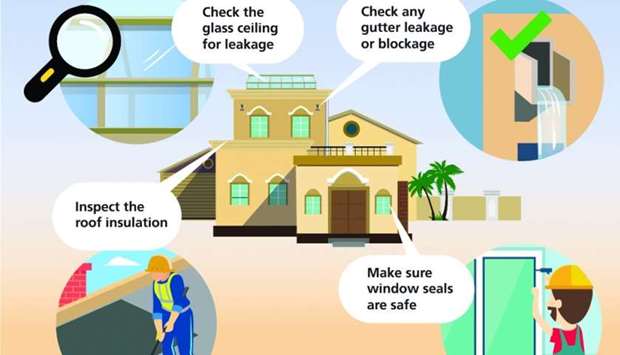The Public Works Authority (Ashghal) is taking a number of measures to ensure that there is no rainwater accumulation on roads around Qatar, it is learnt.
Among the major projects being undertaken is the Mesaimeer Surface and Groundwater Drainage Tunnel Project. Upon completion, it will ensure the proper discharge of surface water and rainwater.
The main tunnel at Mesaimeer will connect the existing and future drainage networks. The tunnel will "operate to drain surface water from sub-networks located in different areas, spread over an estimated 170sqkm area, and minimise rainwater catchments, especially in tunnels, as it’s connected with rainwater drainage networks in 22 tunnels" (for vehicles), Ashghal said in response to a query by Gulf Times.
The tunnel project will also decrease the surface water level and reduce pumping costs in construction projects across the country. Besides, it will help preserve the foundations of buildings by reducing waterlogging.
In addition, there are many integrated infrastructure projects currently under way in various areas, according to Ashghal. "Contracts have been signed to provide infrastructure in new areas. All these projects, upon completion, will have a positive impact and make a big contribution in reducing rainwater catchments. Ashghal has also prepared operational plans for areas that are not yet served with infrastructure,” it added.
Regarding preparations for the coming rainy season, Ashghal has identified rainwater catchment points (hotspots) and started implementing interim solutions until the permanent network is implemented and fully operated. Twenty temporary solutions have been completed to help reduce rainwater accumulation in the most vulnerable areas in Doha in order to enhance operational readiness.
These include the installation of overland pipes with pumps to clear water from streets and drain it into lagoons away from residential areas. The recently completed solutions pertain to Education City, Umm Ebairiya, Al Wakrah, Al Wukair, Arabian Gulf Street and University Street. These areas were heavily impacted by rainwater accumulation last year.
Annual preventive measures to eliminate the effect of rainwater accumulation include the implementation of an operations and maintenance plan for the rainwater drainage network during August and September. Ashghal has cleaned more than 105,000 gullies in different areas, until September, and the cleaning works will continue until the end of the rainy season.
Ashghal, in accordance with the requirements, has also increased the number of tankers and mobile pumps to clear rainwater. Areas that are vulnerable to waterlogging have been identified and necessary equipment and machinery have been put in place for quick response and water removal. Priorities are also defined in terms of securing highways, all tunnels, internal roads, schools zones and health facilities across the country.
At a recently held workshop, Ashghal president Dr Saad bin Ahmad al-Muhannadi instructed contractors and officials concerned to take all important precautions and measures in order to ensure that highways, main roads and tunnels are free from rainwater accumulation, making the safety of road users the top priority.
Every rainy season, Ashghal develops a mechanism to overcome rainwater-related issues and intensifies training for its staff members in order to help them improve the complaint redress time and ensure fast response in dealing with water accumulation.
As part of its role to raise awareness and continuously communicate with the public, Ashghal has launched an awareness campaign on precautionary measures that are to be taken before and during rains. It has also set up platforms for communication through Ashghal’s customer service line, 188, and through various social media channels.


